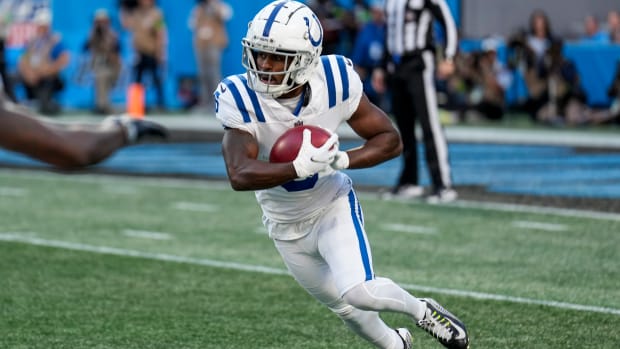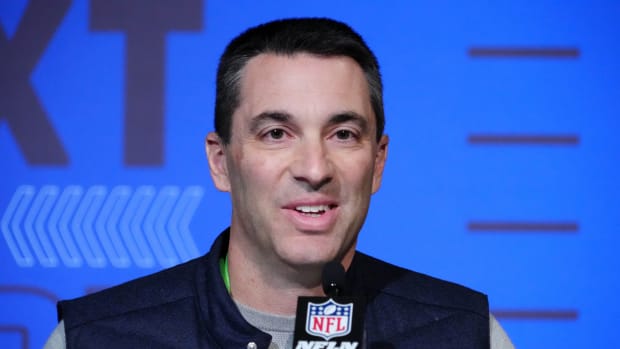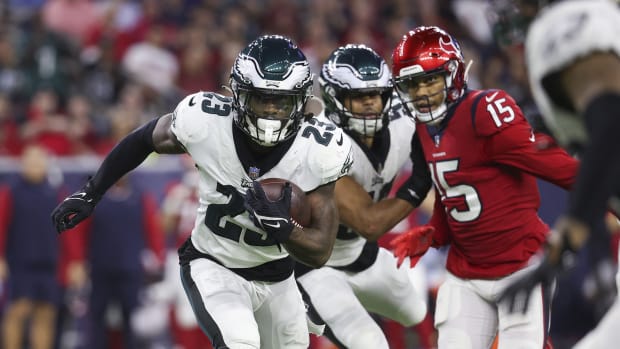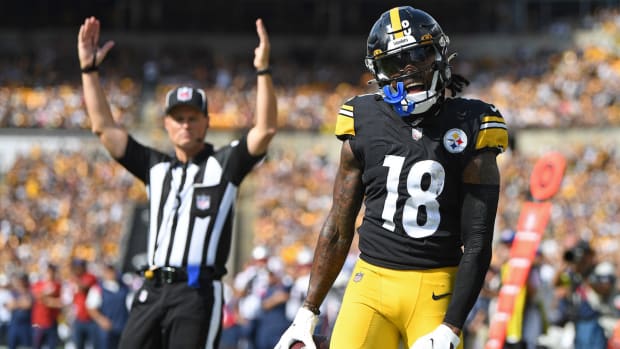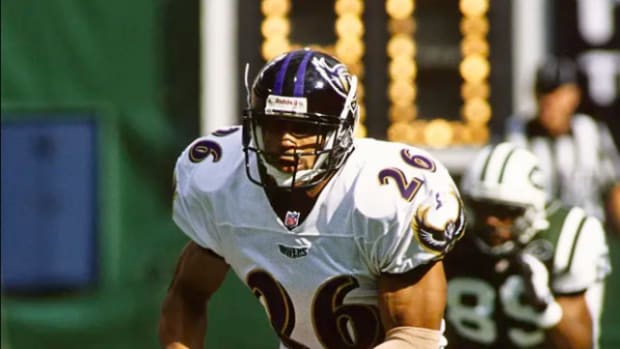How Mike Westhoff Turned Taysom Hill into the Saints' Do-Everything Guy
METAIRIE, La. — In November 2017, the Saints were 7-2 and riding a seven-game winning streak when Sean Payton decided his team needed a shakeup. The Saints had Super Bowl aspirations, and, despite their record, Payton wasn’t satisfied with how his special teams units were performing, so he called up the retired special teams coach Mike Westhoff. Payton convinced Westhoff to come join the Saints staff midseason—and chase a ring.
That week, Payton introduced Westhoff to the players during a team meeting. Payton read off some of Westhoff’s lofty credentials: Miami Dolphins special teams coach, 1986-2000. New York Jets special teams coach, 2001-2012. “He’s one of the OGs in terms of special teams, man,” says Alex Okafor, one of the Saints’ special teams regulars.
Then Westhoff got up and addressed the room. Westhoff had a presence about him, even at 69 years old. He walks with a cane, the result of numerous surgeries and a decades-long recovery from having cancer in his left leg in the ’80s. He doesn’t have much patience for massaging egos or missed assignments. Hey, look, I’m the boss now, Westhoff told the Saints that day. If you can’t do it the way I ask you to do it, we’ll find somebody who will.
ORR: The Saints’ Lost Season: How Sean Payton and New Orleans Survived 2012
Shortly after that, as the story goes, as reported by Bleacher Report and others, Westhoff was walking through the Saints’ locker room when he noticed a player coming out of the shower with a towel around his waist. Who’s that? Westhoff thought to himself. He went to Payton, who told him that was Taysom Hill, the rookie quarterback from BYU. Westhoff asked if he could try Hill on special teams.
Now just more than a year later, Hill is considered among the most dangerous special teams players in the NFL. “It was Westhoff that put him on special teams,” says Rex Ryan, the former Jets coach who worked with Westhoff for four seasons in New York. “It was Westhoff who said, ‘Who is this cat?’ He said, ‘Come here, son, I’m going to change your life.’”
Westhoff had used backup quarterbacks on special teams before. In the 2006 NFL draft, the Jets used a fourth-round pick on Brad Smith, a dual-threat quarterback from Missouri. At the time, conventional wisdom said that Smith wasn’t polished enough to be a starting quarterback. The Jets viewed him as an athlete: a wide receiver, a running back, a wildcat QB. Smith was about 6'2", 215 pounds, and he ran a 4.46 40-yard dash.
Early on, Mike Westhoff brought Smith over to work on special teams, and that’s where Smith made perhaps his biggest impact. Westhoff put him on the kickoff return team, the kickoff coverage team and the punt return team. He gave Smith the dirty jobs: go block someone, go make a tackle, go rush the punter. But perhaps most important of all, Westhoff installed Smith as the personal protector—otherwise known as the fullback—on the punt team.
The personal protector is the player who lines up about three yards behind the line of scrimmage, just off of the center. He makes the calls of the line of scrimmage for the punt team, he acts as the last line of defense for the punter, and he is the person best positioned to receive the snap—instead of the punter—if the coach wants to run a fake punt.
Putting Brad Smith in that spot created all sorts of problems for the opposing team. For one, being a quarterback, Smith had experience calling out protections and getting everyone set at the line. Westhoff is particularly picky about that, in all facets of special teams. “When you’re blocking, if you’re off by a half a yard, he’d get on you for that,” Smith says. “If you were supposed to be turned at a 45-degree angle and you were at 60 degrees, he’d get on you, because it affected the rest of the play and how things would turn out.”
ROSENBERG: Todd Marinovich Is Learning to Be Human Again
If Westhoff wanted to run a fake, too, Smith had the ability to either throw or run. Ryan says that when Westhoff was his special teams coach, from 2009 to 2012, Westhoff had “carte blanche” to call a fake whenever he wanted. “He had a mentality that he was going to bury you,” Ryan says. He trusted that Westhoff had studied enough to make the right call.
Westhoff would often discuss the game plan with Smith and tell him details he didn’t tell other players. “Maybe their right guard on the punt team didn’t take a quick enough first step,” Smith says, “so we’d try to attack that guy a certain way. Or maybe the right wing is big and slow, so we’d attack that guy. Whenever he saw something, he’d put it in the package.” They had a good rapport going, Westhoff and Smith. And then in 2011, Smith left in free agency.
About a year later, the Jets traded for Tim Tebow from the Broncos. The general idea was, Tebow would fill in as a wildcat quarterback and play lots of special teams—à la Brad Smith. “Tebow wanted everyone to know he was a quarterback,” Ryan says. “We all knew he wasn’t. But we thought he was a football player and a competitor, and that’s why we used him [on special teams]. … [Westhoff] could take anybody — anybody that had guts, toughness, heart; anybody who had those characteristics — and he’d find a spot for you.”
Westhoff used Tebow as the personal protector, too. It was the one role in which Tebow excelled that season. He went 3-for-4 converting fake punts for first downs. But Ryan wants to make clear: Tebow wasn’t as versatile a special teams player as Smith. “Don’t put Tebow in the same category as Brad, because he wasn’t,” Ryan says. “Brad was special.”
No, the Jets’ punt team was probably the most dangerous in 2009 and ’10, when Smith was the personal protector, and Steve Weatherford was the punter. Weatherford wasn’t your average punter; he was a decathlete. The coaches gave him the green light to fake a punt and take off running whenever he wanted. For Westhoff, the options were endless. “[The opponent] could never get comfortable,” Ryan says. “Your punt rush—you better worry about us. We were crazy enough to fake from anywhere. That was all from Westy.”
The Jets lost in the AFC Championship Game both of those years. After about three decades of coaching football, that was the closest Westhoff ever came to reaching the Super Bowl.
When Westhoff spotted Taysom Hill in the locker room, Hill was the Saints’ third-string quarterback, an undrafted rookie who’d never played in a regular-season NFL game. He was waiting his turn behind Drew Brees, one of the greatest quarterbacks of all time. “It’s not a ton of fun being a backup quarterback,” Hill admits. He wanted to contribute somehow. Then one day he saw his name show up on the depth chart—he’d be playing special teams.
As the season wound down, Hill picked up his new role on the fly. Some days he would stay after practice to learn proper tackling technique, to play on the kick coverage team. Hill says that Westhoff spoke to him “about what my responsibility was, what my role was, and what I needed to do. Then after that it was, ‘Hey, go be a football player.’”
Hill had all the prerequisite physical traits Westhoff wanted in a special teams player. He stood 6'2" and about 220 pounds, and he ran a 4.44 40 at his pro day, which meant he was a stronger, faster version of Brad Smith. In college Hill was a dual-threat quarterback who had a bruising running style and a decent amount of reckless abandon. Hill didn’t shy away from contact, which may have contributed to the vast number of injuries he suffered at BYU. Those injuries, in turn, may have contributed to Hill going undrafted in 2017.
But playing special teams, those traits served him well. In his first NFL game, in December 2017, Hill made two tackles on kickoffs and almost blocked a punt. After that first game Westhoff started expanding Hill’s role. There Hill was on the kickoff return team, blocking for Alvin Kamara. There he was on the punt block team, rushing the punter. Westhoff designated Hill as the backup holder, the backup long-snapper, the Saints’ do-everything guy.
WILDER: Jeff Fisher Is More Than Your 7–9 Jokes; Here’s What He’s Up To Now
After all of his years of coaching special teams, it seemed Westhoff had found his ultimate chess piece in Taysom Hill, a guy he could plug into any unit, any situation. “He’s like the queen in chess, as far as special teams goes,” says Thomas Morstead, the Saints’ punter. “You give the guy a ball and it’s like, ‘Oh, you need me to throw it? You need me to snap it? You need me to hold it? You need me to punt it?’ He can do everything at a decent level.”
Hill’s teammates started calling him Jim Thorpe, because of the number of positions he plays. Hill does have a throwback style about him, and that shows up especially on the punt block team, where Westhoff allows his players the freedom to rush however they like. One day in practice this season, Hill and Alex Okafor came up with a new rush sequence on their own: Okafor would drive upfield and occupy a blocker, and Hill would swing around his backside and charge like a defensive end on a stunt. In Week 14, Hill used that play to block a punt against Tampa Bay and spark a Saints’ comeback win. “That was just one of those things we randomly did in practice,” Hill says, “because we were getting bored with the normal rush.”
Hill makes perhaps his biggest impact on the punt team, where Westhoff has installed him as— what else?—the personal protector. Like Brad Smith before him, Hill is the quarterback of Westhoff’s punt team. When the Saints’ punt unit takes the field, Hill sets up the protection, he reads the defense, and then he checks them into a play based on how the defense is aligned. Ultimately, Westhoff is the one who calls the fakes. But Hill has freedom to audible if need be. Most of the time, if Hill is calling an audible, it’ll be to cancel a fake punt call because he doesn’t like its chances. But, he adds, “If there’s something that screams at us, we have calls where we can go from a punt to a fake based on what they’re doing.”
Then after the play is over, Hill and Westhoff will talk on the sideline about what Hill saw on the field and why he made the call he did—the same way a quarterback talks to his offensive coordinator after a drive. “If you have the quarterback as your [personal protector], I think the punt play can be viewed as another offensive play, essentially,” Hill says.
This is a dramatic shift from the Saints’ previous philosophy. Morestead has been the Saints’ punter for 10 seasons now, all with Payton as head coach. He says that, for the majority of his time here, for whatever reason, the Saints haven’t run many fake punts. Then here came Westhoff, a coach who had the experience and the feel for the right time to call a good fake. “Mike’s done this long enough, he’s borderline confident or arrogant—whatever you want to call it,” Morstead says. “He knows his stuff works. … and I think our whole unit has taken on that energy.”
This season, Hill has run two successful fake punt plays: one in Week 4 against Giants, and another in Week 7 against the Ravens. The benefit goes beyond those two plays, though. The Saints believe that those fakes give them an added, incalculable advantage, because opposing teams are now worried about Hill faking it. They play safer, more conservative on their punt returns. They seem to think twice before sending an aggressive rush after Morstead.
The Saints’ offensive coaches have taken notice, too. Sean Payton has installed packages in which Hill lines up as a quarterback or a tight end. Often Hill comes in to spell Brees to run some option plays. This season Hill rushed 37 times for 196 yards and two touchdowns. He has also completed three of seven passes, though he did throw an interception in Week 16 against the Steelers.
In another life, perhaps none of this would have come to be. Tebow recently told the Times-Picayune that at one point (likely before Westhoff arrived in New Orleans), Sean Payton had spoken to him about coming to the Saints to fill a role similar to what Taysom Hill does now. Tebow viewed himself as strictly a quarterback, though, and he apparently passed on the offer.
For what it’s worth, Hill is holding out hope that he’ll get a chance to be a starting quarterback one day, too. “Hopefully at some point, that transitions,” he says. “Where I have the opportunity to be the guy.” For now, he’ll have to settle for being the change-up on offense and the ace-in-the-hole on special teams.
As the Saints head into the divisional round of the playoffs now, as the No. 1 seed in the NFC, the stakes will get higher, the games will get tighter. One play from Hill could provide the difference. He knows whom he can thank for that. “Mike, at the end of the day, believed in me,” Hill says. “He created an opportunity for me to make plays. And I made them.”
• Question or comment? Email us at talkback@themmqb.com.
































